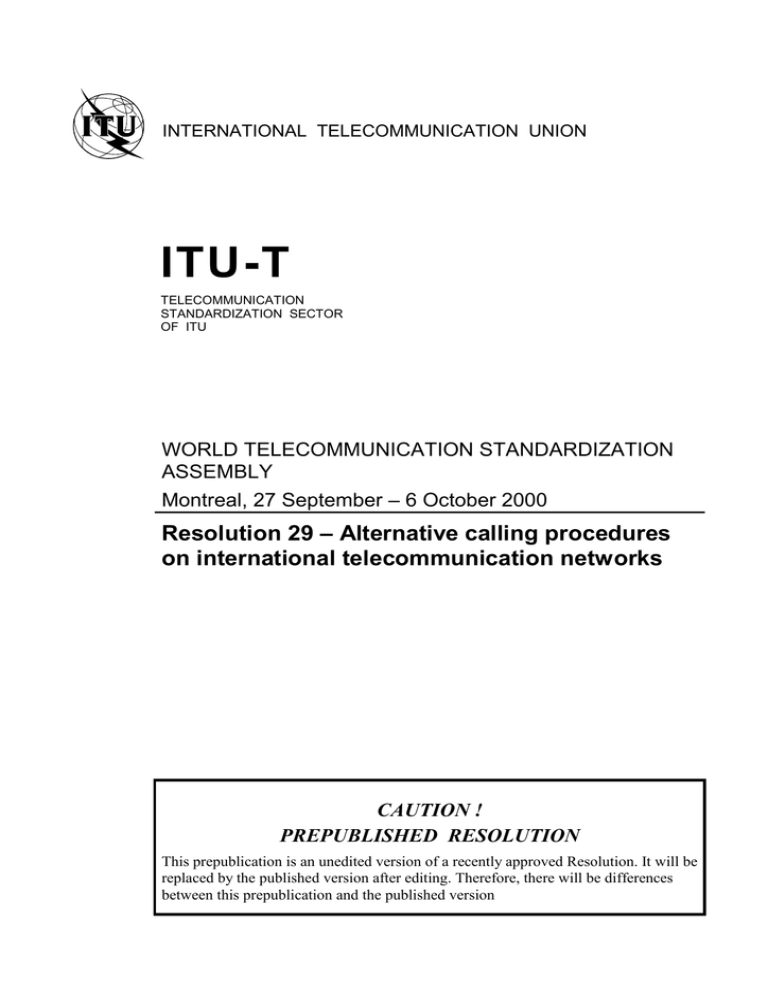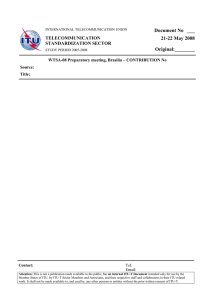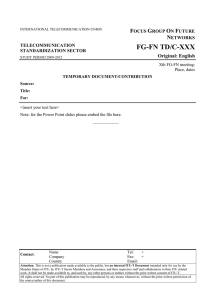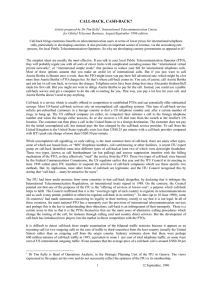
INTERNATIONAL TELECOMMUNICATION UNION
ITU-T
TELECOMMUNICATION
STANDARDIZATION SECTOR
OF ITU
WORLD TELECOMMUNICATION STANDARDIZATION
ASSEMBLY
Montreal, 27 September – 6 October 2000
Resolution 29 – Alternative calling procedures
on international telecommunication networks
CAUTION !
PREPUBLISHED RESOLUTION
This prepublication is an unedited version of a recently approved Resolution. It will be
replaced by the published version after editing. Therefore, there will be differences
between this prepublication and the published version
FOREWORD
The International Telecommunication Union (ITU) is the United Nations specialized agency in the field of
telecommunications. The ITU Telecommunication Standardization Sector (ITU-T) is a permanent organ of
ITU. ITU-T is responsible for studying technical, operating and tariff questions and issuing
Recommendations on them with a view to standardizing telecommunications on a worldwide basis.
The World Telecommunication Standardization Assembly (WTSA), which meets every four years,
establishes the topics for study by the ITU-T study groups which, in turn, produce Recommendations on
these topics.
The approval of ITU-T Recommendations is covered by the procedure laid down in WTSA Resolution 1.
In some areas of information technology which fall within ITU-T’s purview, the necessary standards are
prepared on a collaborative basis with ISO and IEC.
ITU 2000
All rights reserved. No part of this publication may be reproduced or utilized in any form or by any means,
electronic or mechanical, including photocopying and microfilm, without permission in writing from ITU.
RESOLUTION 29
Alternative calling procedures on international telecommunication networks
(Montreal, 2000)
The World Telecommunication Standardization Assembly (Montreal, 2000),
recalling
a)
Resolution 1099 of the Council (Geneva, 1996) concerning alternative calling procedures
on international telecommunication networks which urged ITU-T to develop, as soon as possible,
the appropriate recommendations concerning alternative calling procedures;
b)
Resolution 22 of the World Telecommunication Development Conference (Valletta, 1998),
which resolved:
i)
to encourage Administrations and ROAs to enhance the effectiveness of ITU's role and to
give effect to its recommendations in order to promote a new and more effective basis for
the accounting regime which would help limit the negative effects of alternative calling
procedures on developing countries;
ii)
to request the Telecommunication Development Sector (ITU-D) and ITU-T to collaborate
so as to avoid any duplication of work, and achieve an outcome based on the spirit of
Resolution 21 (Kyoto, 1994) of the Plenipotentiary Conference;
iii)
to request Administrations and ROAs of countries which permit the use of alternative
calling procedures to respect the decisions of other Administrations and ROAs whose
regulations do not permit such services;
c)
Resolution 21(Rev. Minneapolis, 1998) of the Plenipotentiary Conference concerning
alternative calling procedures on telecommunication networks, which
i)
urged Member States and Sector Members to continue to cooperate among themselves on
the effective application of the Resolutions adopted by ITU
;ii)
resolved to urge ITU-T, in close communication with ITU-D to coordinate activities in
order to avoid duplication;
d)
Recommendation D.201 of ITU-T which sets out principles for Administrations to follow
while providing or permitting the provision of call-back practices;
e)
the purposes of the Union to foster collaboration among Members for the harmonious
development of telecommunications and to enable offering of services at lowest cost,
recognizing
a)
that call-back is permitted in some countries and not in others;
b)
that call-back offers alternative calling procedures which may be attractive for users;
WTSA-2000 – Resolution 29 – Prepublished version
1
c)
that call-back affects the revenue of ROAs which may seriously hamper, in particular, the
efforts of the developing countries for the sound development of their telecommunication networks
and services;
d)
that distortion in traffic patterns resulting from call-back may impact traffic management
and network planning;
e)
that some forms of call-back seriously degrade the performance and quality of the Public
Switched Telephone Network (PSTN),
reaffirming
that it is the sovereign right of each country to regulate its telecommunications and as such it may
permit, prohibit or otherwise regulate call-back in its territory,
noting
that in order to minimize the effect of alternative calling procedures
a)
ROAs should, within their national law, make their best efforts to establish the level of
collection charges on a cost orientated basis taking into account Article 6.1.1 of the International
Telecommunication Regulations and ITU-T Recommendation D.5;
b)
Administrations and ROAs should vigorously pursue the implementation of
Recommendation D.140 and the principle of cost orientated accounting rates and accounting rate
shares;
resolves
1
that Administrations and ROAs should take all reasonable measures, within the constraints
of their national law, to suspend the methods and practices of call-back which seriously degrade the
quality and the performance of the PSTN, such as constant calling (or bombardment or polling) and
answer suppression;
2
that Administrations and ROAs should take a cooperative and reasonable approach to
respecting the national sovereignty of others and suggested guidelines for this collaboration are
attached;
3
to continue developing appropriate recommendations concerning alternative calling
procedures and, in particular, the technical aspects of the methods and practices of call-back which
seriously degrade the quality and the performance of the PSTN, such as constant calling (or
bombardment or polling) and answer suppression;
4
to continue consideration of other aspects of alternative calling procedures.
calls upon
the Director of TSB to cooperate with the Director of BDT in order to facilitate the participation of
developing countries in these studies as well as in caring for such studies.
WTSA-2000 – Resolution 29 – Prepublished version
2
ATTACHMENT
(to Resolution 29)
Suggested guidelines for administrations and ROAs for
consultation on call-back
In the interest of global development of international telecommunication, it is desirable for
Administrations and ROAs to cooperate with others and to take a collaborative and reasonable
approach. Any cooperation and any subsequent actions would have to take account of the
constraints of national laws. The following guidelines are recommended to be applied in country X
(the location of the call-back user) and country Y (the location of the call-back provider) regarding
call-back. When call-back traffic is destined to a country other than countries X or Y, the
sovereignty and the regulatory status of the destination country should be respected.
Country X (location of call-back user)
A generally collaborative and reasonable approach is
desirable
Country Y (location of call-back provider)
A generally collaborative and reasonable
approach is desirable
Administration X, wishing to restrict or prohibit
call-back, should establish a clear policy position
Administration X should make known its national
position
Administration Y should bring this information
to the attention of ROAs and call-back providers
in its territory using whatever official means are
available
Administration X should instruct ROAs operating in its
territory as to the policy position, and those ROAs should
take steps to ensure that their international operating
agreements comply with that position
ROAs in Y should cooperate in considering any
necessary modifications to international
operating agreements
Administration Y and/or ROAs in Y should seek
to ensure that call-back providers establishing an
operation in their territory are aware that:
a) call-back should not be provided in a country
where it is expressly prohibited, and
b) the call-back configuration must be of a type
which will not degrade the quality and
performance of the international PSTN
Administration X should take all reasonable steps within
its jurisdiction and responsibility to stop the offering
and/or usage of call-back in its territory which is:
Administration Y and ROAs in Y should take all
reasonable measures to stop call-back providers
in its territory offering call-back:
a) prohibited; and/or
a) in other countries where it is prohibited;
and/or
b) harmful to the network.
ROAs in country X will cooperate in the implementation
of such steps.
b) which is harmful to the networks involved.
NOTE - For relations between countries who regard call-back as an "international
telecommunication service" as defined in the International Telecommunication Regulations,
bilateral operating agreements should be required between the ROAs concerned as to the conditions
under which call-back will be operated.
WTSA-2000 – Resolution 29 – Prepublished version
3
_________
WTSA-2000 – Resolution 29 – Prepublished version
4




